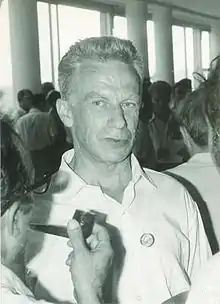Sergei Sobolev
Prof Sergei Lvovich Sobolev (Russian: Серге́й Льво́вич Со́болев) HFRSE (6 October 1908 – 3 January 1989) was a Soviet mathematician working in mathematical analysis and partial differential equations.
Sergei Lvovich Sobolev | |
|---|---|
 Sobolev in Nice in 1970 | |
| Born | 6 October 1908 |
| Died | 3 January 1989 (aged 80) |
| Alma mater | Leningrad State University, 1929 |
| Known for | Sobolev space, generalized functions |
| Awards | 1941, 1951, 1953 Stalin Prize, 1986 USSR State Prize, Hero of Socialist Labor 1951, Lomonosov Gold Medal 1988 (posthumously) |
| Scientific career | |
| Fields | Mathematics |
| Institutions | Steklov Mathematical Institute, Lomonosov Moscow State University, Kurchatov Institute, Novosibirsk State University, Sobolev Institute |
| Doctoral advisor | Nikolai Günther |
| Influenced | Functional analysis, partial differential equations |
Sobolev introduced notions that are now fundamental for several areas of mathematics. Sobolev spaces can be defined by some growth conditions on the Fourier transform. They and their embedding theorems are an important subject in functional analysis. Generalized functions (later known as distributions) were first introduced by Sobolev in 1935 for weak solutions, and further developed by Laurent Schwartz. Sobolev abstracted the classical notion of differentiation, so expanding the range of application of the technique of Newton and Leibniz. The theory of distributions is considered now as the calculus of the modern epoch.[1]
Life
He was born in St. Petersburg as the son of Lev Alexandrovich Sobolev, a lawyer, and his wife, Natalya Georgievna.[2] His city was renamed Petrograd in his youth and then Leningrad in 1924.
Sobolev studied Mathematics at Leningrad University and graduated in 1929, having studied under Professor Nikolai Günther. After graduation, he worked with Vladimir Smirnov, whom he considered as his second teacher. He worked in Leningrad from 1932, and at the Steklov Mathematical Institute in Moscow from 1934. He headed the institute in evacuation to Kazan during World War II. He was a Moscow State University Professor of Mathematics from 1935 to 1957 and also a deputy director of the Institute for Atomic Energy from 1943 to 1957 where he participated in the A-bomb project of the USSR.
In 1956, Sobolev joined a number of scientists in proposing a large-scale scientific and educational initiative for the Eastern parts of the Soviet Union, which resulted in the creation of the Siberian Division of the Academy of Sciences.[3] He was the founder and first director of the Institute of Mathematics at Akademgorodok near Novosibirsk, which was later to bear his name, and played an important role in the establishment and development of Novosibirsk State University. In 1962, he called for a reform of the Soviet education system.[4]
Family
In 1930 he married Ariadna Dmitrievna.[2]
Publications
In 1955 he co-wrote The Main Features of Cybernetics with Alexey Lyapunov and Anatoly Kitov which was published in Voprosy filosofii.
See also
Notes
- e.g. Friedman, A. (1970). Foundations of modern analysis. Courier Corporation, p. iii
- Biographical Index of Former Fellows of the Royal Society of Edinburgh 1783–2002 (PDF). The Royal Society of Edinburgh. July 2006. ISBN 0-902-198-84-X.
- "The Siberian Branch, an overview Siberian Branch of the Russian Academy of Sciences (SB RAS)". sbras.ru. Retrieved 1 March 2018.
- Berg A., (1964), 'Cybernetics and Education' in The Anglo-Soviet Journal, March 1964, pp. 13–20
- O'Connor, J J. "Sergei Lvovich Sobolev".
References
- Sobolev, Sergei L. (1936), "Méthode nouvelle à résoudre le problème de Cauchy pour les équations linéaires hyperboliques normales", Matematicheskii Sbornik, 1(43) (1): 39–72, Zbl 0014.05902 (in French). In this paper Sergei Sobolev introduces generalized functions, applying them to the problem of solving linear hyperbolic partial differential equations.
- Sobolev, Sergei L. (1938), "Sur un théorème d'analyse fonctionnelle", Recueil Mathématique de la Société Mathématique de Moscou, 4(46) (3): 471–497, Zbl 0022.14803 (in Russian, with French summary). In this paper Sergei Sobolev proved his embedding theorem, introducing and using integral operators very similar to mollifiers, without naming them.
Bibliography
- O'Connor, John J.; Robertson, Edmund F., "Sergei Sobolev", MacTutor History of Mathematics archive, University of St Andrews.
- Sergei Lvovich Sobolev (1908-1989). Bio-Bibliography (S.S. Kutateladze, editor) Novosibisrk, Sobolev Institute (2008), ISBN 978-5-86134-196-7
- Sergei Lvovich Sobolev., in: Russian Mathematicians in the 20th Century (Yakov Sinai, editor), pp. 381–382. World Scientific Publishing, 2003. ISBN 978-981-238-385-3
- Jean Leray. La vie et l'œuvre de Serge Sobolev. [The life and works of Sergeĭ Sobolev]. Comptes Rendus de l'Académie des Sciences. Série Générale. La Vie des Sciences, vol. 7 (1990), no. 6, pp. 467–471.
- G. V. Demidenko. A GREAT MATHEMATICIAN OF 20th CENTURY. On the occasion of the centenary from the birthdate of Sergei Lvovich Sobolev. Science in Siberia, no. 39 (2674), 2 October 2008
- M. M. Lavrent'ev, Yu. G. Reshetnyak, A. A. Borovkov, S. K. Godunov, T. I. Zelenyak and S. S. Kutateladze. Remembrances of Sergei L'vovich Sobolev. Siberian Mathematical Journal, vol. 30 (1989), no. 3, pp. 502–504 doi:10.1007/BF00971511
External links
 Media related to Sergei Lvovich Sobolev (mathematician) at Wikimedia Commons
Media related to Sergei Lvovich Sobolev (mathematician) at Wikimedia Commons- Sergei Sobolev at the Mathematics Genealogy Project
- Sobolev Institute of Mathematics
- Kutateladze S.S.,Sobolev and Schwartz: Two Fates and Two Fames
- Kutateladze S.S.,Sobolev of the Euler school
- ru:Соболев, Сергей Львович
- Sobolev's Biography in Russian